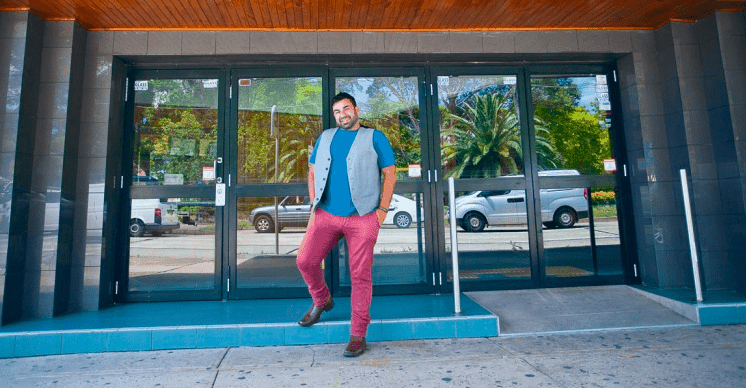
You don’t come across many people like Billy Cotsis day to day. A second generation Greek Australian with an unfaltering desire to discover and promote the Greek communities that are to be found in remote areas all around the world, including villages in Albania, Beirut and the Ukraine. If there are Greeks there, you can assume Billy has paid them a visit.
At just 40 years of age he has managed to travel to over 50 countries, 65 Greek islands, and is not looking to stop any time soon. An experienced journalist, an author of two books, a film maker (his documentary Lesvos Fall in Love was critically acclaimed), with many more projects in the works, he also lends his time to delivering lectures on Hellenism and the Greek communities he has studied so thoroughly.
GCT recently had a chat to Billy about his new book From Pyrrhus to Cyprus, and the many things he is renowned for, including his appreciation for the hardworking migrant generation of his parents, his extensive travels, his tireless research and documentation of Greek communities around the world, and his devotion to Lesvos.
“I realised that Greece is everywhere and my own story starts in the Greek speaking Asia Minor”
How would you describe your connection with Greece?
It’s in my heart. I wasn’t a massive fan of Greece and had a 12 year absence when I returned as a 22 year old. I had actually stopped speaking the language and spent my holidays travelling around Australia, which I genuinely love to do. This sudden trip to Greece and a few weeks on Lesvos was enough to awaken a dormant connection to Greece. I was alive, well and truly mentally, physically and spiritually. I trekked to Asia Minor (Turkey) and found the village of my pappou Vasilis. It was an enlightening moment. I realised that Greece is everywhere and my own story starts in the Greek speaking Asia Minor.
These days I go every year and I have spent two and half years in Greece, and travelled to 65 of its island. I am undoubtedly home when I get there.
Do you feel you have 2 patrides?
Absolutely. Greece and Australia are in my heart. At times, it is hard to reconcile the Australian element as I spent my youth staring down racism. In my life, I was only ever called ‘Aussie’ when I lived in London. Not even in Greece have I ever been called ‘Afstralo.’
I take great pride in my home, Australia. as I take enormous pride in Greece, and also my other home, London. I am what is known as a ‘Londoner.’
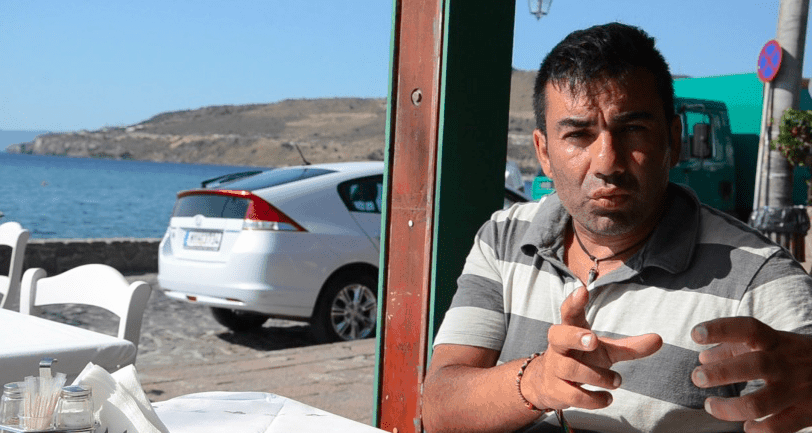
Tell us about Lesvos Fall in Love? What prompted you to embark on this project? What has the response been like? What challenges did you encounter while making this short film?
Firstly, I am grateful to the Mytilenean Brotherhood of NSW for their support and sponsorship, and my buddy in London, a talented filmmaker called Basil Genimahaliotis. This documentary would never have been made without them.
We wanted to showcase a road trip and some of my own stories on the island. I have been to Lesvos about twenty times and I have seen just about everything. It’s such a beautiful island, and it is amazing how we welcomed refugees and those seeking haven in recent years. The international press, however, pedalled a few inaccurate stories of the island being swamped and struggling. The documentary was about exploring how safe, accommodating and cultural a trip to the island can be. We focused on culture, travel, scenic elements and the impact of refugees, which is minimal. Lesvos, throughout its history, has never turned its back on anyone.
The filming was smooth, aside from drinking too much ouzo, having unlimited fun, meeting some quirky people and getting a fascinating insight into island life and business life.
The local press described the documentary as a cinematic love letter. I tend to agree, as we love our island and this comes through what you will see on the big screen. It has been shown in London, Europe and Australia. I will never forget the night we teamed up with the Greek Film Festival and the Mytilenean Brotherhood with two cinema sessions selling out, and launching the documentary with ouzo and tyripota giveaways. My mum had a field day baking for the occasion.
Tell us about your journey into writing and also writing your first book The Many Faces of Hellenic Culture?
I started writing for O Kosmos newspaper as a student and they were amazing and supportive. I think I produced features for them 1995 until 2011. Along the way I wrote for a few Greek magazines in Europe and here, again I had very supportive editors, and was glad that my content was not just a page filler.
In 2002, I came across an article about Greek speakers in Italy. The area we would call Magna Graecia. I went there to see these towns up close and to meet the people known as Grecanica. I felt proud of my Hellenic roots; you see these people holding on to a Byzantine dialect deep in the Calabria mountains, as well as Apulia, and you feel PROUD. They are poor yet they are richer than we can imagine as they are the living, breathing link to our past. I wish more people would visit them. I resolved to bring their story back to Australia and to find more communities such as these.
Since that time, I make my own way to remote places and find the communities that have a link to our past. Albania, Bulgaria, Egypt, Lebanon, Syria, Tunisia, Ukraine to name a few. I have never been funded, I just do it. Their stories need to be told. Readers need to know that these people are heroes. They maintain the language and culture in at times hostile environments. If they can do it, we can do it too.
In 2012, I came home from London after a few years abroad. I decided I needed to write before I get distracted and focus on career and life matters. Since then I have written 8 short film projects, and two book titles. The first book, The Many Faces of Hellenic Culture covers places I have visited in four continents. My best friend George maintains a blog (www.herculean.wordpress.com) with all my adventures. Thanks to him and the encouragement of others, I compiled all my stories for the first book which came out last year and it sold out two editions!
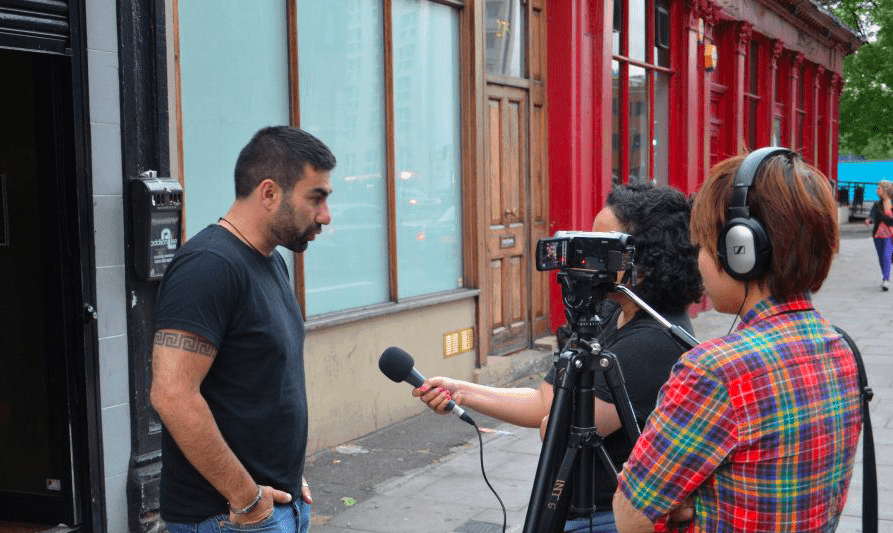
Did you always intend on branching into film making?
Yes, as I am a mad film buff. I wanted to create a story based on Byzantium and started writing a screenplay in 2007 but managed to lose it when I lived in London. Annoyed with my lap top, and also the knowledge that Byzantium is not yet sexy enough, I let it go until 2012. Since then I have explored short film as a platform for political satire. For example, The Draconian Decision of a German Drachma, which won an award in London. The theme was, what if Germany was poor and Greece was rich? How would the Greek cabinet, led by Acibiades, Pericles, Leonidas, Philipos, Mercouri and Belisarios help the Germans as they deliberate at a taverna!
I still want to make a film on Byzantium. However, living in Sydney means that this type of genre and topic will not attract funding, unless I find a wealthy fan of the Byzantine Empire!
Later this year, we will be shooting in Mykonos to show the other side of the party, glamorous island it has become. We’re looking for investors, though we usually fund these projects ourselves. It will be a lot of fun and exciting to bring to people other elements of this island. I have also been asked to come across to Syros to be interviewed on TV there, and can’t wait!
“I wanted people to know that we have such a long and rich history that covered most of the known world”
Tell us about From Pyrrhus to Cyprus? How did you go about choosing these topics and why was this an important book for you to write?
From all of my own travels and research, I uncovered vast areas where the Hellenes ruled or colonised. Yet when I ask people in Australia or the US what they know of Greek empires and territory, they inevitable settle on Athens, Sparta, Macedonia, Syracuse. We have more to offer in terms of kingdoms and quirky territories. I wanted people to know that we have such a long and rich history that covered most of the known world.
The Greek world for me was never about mainland Greece, it was always much bigger. Hellenes travelled in search of colonies, new territories and empires. They founded hundreds of colonies and territories in the Mediterranean, Black Sea, Africa and Asia. A number of these survive to this day, with many of the inhabitants speaking a dialect of Greek and maintaining differing aspects of Hellenic culture. It is important that we never forget how far the Hellenes were able to reach and in many cases directly rule vast territories far beyond the Greek heartland. This book therefore brings you an overview of 36 identified Greek “territories,” after the disintegration of the empire built up by Alexander the Great. Starting with Pyrrhus, the king of Epiros, the book also provides an overview of the conquests of Alexander and the Hellenistic Age, Byzantine Empire, Trebizond, Ionian Republic and many more.
The chapters are connected by the brilliant writer, Thucydides; he is the reason why history is written the way it is today. Thucydides was an exiled Athenian general in the Fifth Century who decided to write a balanced account of the Peloponnesian War. This book is therefore a tribute to his skill and balance as a writer. In order to create Thucydides as a connector, and in a nod to the ancient paganistic rituals of the Hellenes, the God Apollo casts a spell on Thucydides to live for eternity. Thucydides travels around the world documenting the Greek places he discovers until he gets to the modern age, by which time, you the reader will have had an entry point to the incredible array of Greek territories that existed and shape our destiny.
I’d like to also say, this book would not exist without the generous support of the Hellenic Club of Sydney, and my friends Magdalena Gonzales in Argentina and Dr Victor J.
What inspires you?
My parents. They have had a long struggle and that inspires me. Both had a parent who died when they were in primary school, both did not finish school. Mum was forced to work by what she knew to be her “father” at the age of nine years old and dad had to tend the fields as a young boy in place of his deceased father. Dad was born in World War II, both lived through the brutal Civil War, the famine of the 1950s and early dictatorship. Add to that racism in Sydney and longs days in factories to make ends meet. My mum was still on the factory floor just days before she had me. WE HAVE NO IDEA what it is like to go through poverty, hardship, a lack of childhood, and bigotry.
I feel blessed every moment, as I have a good life. I had grandparents who were refugees from Asia Minor. All this means that I have to work hard for my community, migrants and refugees and do the best that I can to make people’s lives better. I actually have a four day week job where I manage a Community Development team. I work not to make money, I work to pay for projects that help other people, preserve our history or create messages of hope.
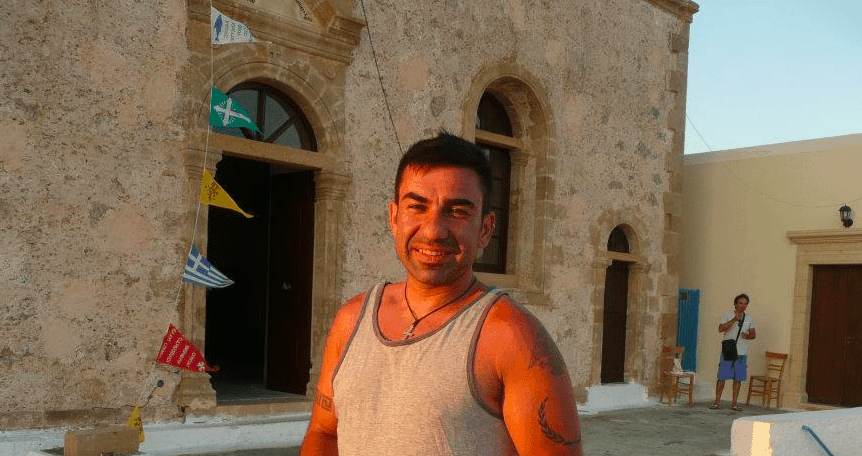
What has years of travel to over 50 countries taught you?
How blessed we are. Australia is amazing and wonderful. We complain at times about trivial matters. Try visiting a town in Morocco which has nothing, or a run-down Greek village in the Ukraine which is just grateful that someone has taken the time to visit. I have been to places of real poverty, where people give me food and friendship. I have learned that life is a pleasure, not a burden, when you are born in Sydney. I also appreciate culture. I was in Japan once and I felt like I was in the Beatles. Along with my mate who was working there arranging some visits to schools, for example, we’d turn up and hundreds of kids are waiting in a human tunnel, banners with our names, every child with an Australia flag and just being mobbed.
Another thing I learnt from the Greek areas I visited is that we have to preserve the history, we must support or visit them, for they need it.
What are some stand-out experiences from your travels?
I recall a trip to Calabria and to the village of Gallaciano. Around 200 people live there, on a mountain. The entire village came out to greet us and to walk around. The head of the village, who was a young man in his late 30s, then said to me in Byzantine Greek, “mas dineis diname Vasilis.” I felt as though I had stepped back to the 1700s. These people were authentic and a living link to the Greek past of Italy.
I remember swimming a distance off Symi, and climbed onto a deserted island with just a church. As I got ashore, I heard an Aussie accent say, “welcome to paradise, friends.”
The Ukraine is a true highlight over two trips. I was in Marioupolis near the Russian border and a local, Athena, made a call to the town of Sartana informing them that I was here. It was a Sunday. They immediately opened the Greek museum for me and arranged for the curator to meet us. She was dressed in the local Greek costume and sang local Greek poetry for me. I still get a chill when I think about the visit. Another time I was in Kiev and Athena informed me that in the city of Odessa I could find the Philiki Eteria museum, the birthplace of the Greek Revolution. Immediately I booked flights and we turned up out of hours, and again Athena arranged special access for me. To tour the house where the Greek freedom was born, was surreal. Everything was well preserved including documents.
Tell us about your love of Greece's islands, having explored so many?
Every island is a nation, with their own dialect, way of life and culture. Remember, Greece never existed until modern times. I marvel at how they keep their identity and local customs going. I have been to 65 islands and I can’t stop. The goal was 60, and I am still doing it, though these days I prefer flying rather than boating it to places.
There is nothing better than summer and the welcome each island provides you. All generations are appreciated and for a few days, you can belong if you wish, or just switch off and do your own thing. Always act as an ambassador for where you come from and show the locals respect, even if they can be a little quirky or overbearing.... I mean, how many times do they need to feed me and give me an ouzo, haha!
I have been to some islands where you have just one settlement, goats, a taverna and paradise.
What are your top 5 favourite places in the world?
London – you have never seen true multiculturalism until you visit. I love this city with all my heart, it has welcomed me no end.
Athens – memories and more memories begin here. I have made many friends and I get excited about the modern culture, beach outings and food!
Beirut – you can feel the vibe and the craziness. If you want to experience craziness and Arabic culture, this is a city for you.
New York – oh my, words fail me. It was minus 12 degrees and my fingers turned Hellenic blue, yet I was at home, I felt I belonged.
Bova Marina in Magna Graecia – street signs in Greek and English, everyone is either Greek or wants to tell you a story about being a Hellene.
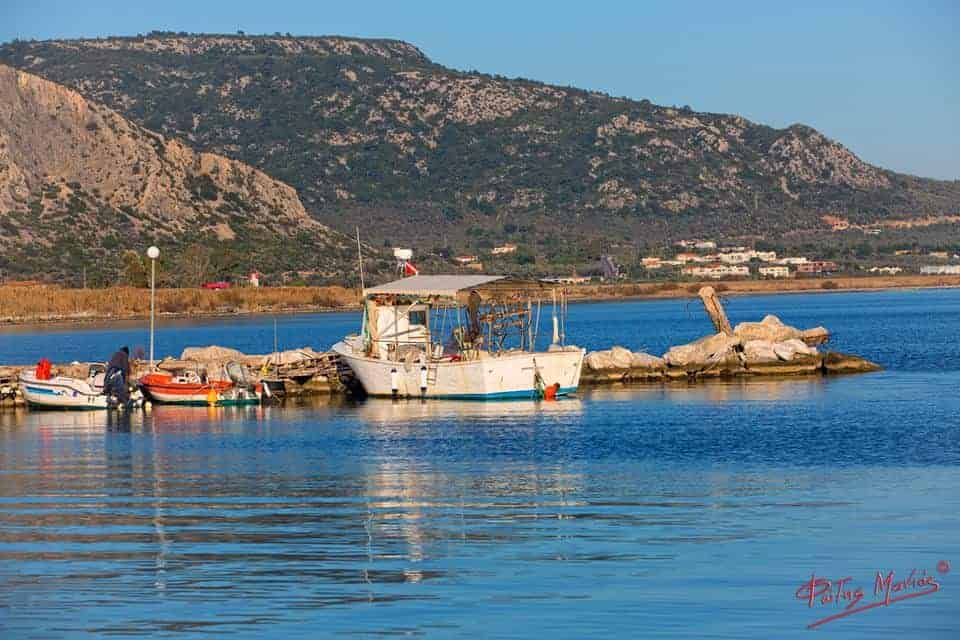
What is your hope for Lesvos? And for Greece?
I am working with a range of people to make sure we promote the island as much as possible. It’s an island of immense beauty, history and industry. This last point is the key. Lesvos can’t rely on tourism, it has to focus on inward investment. We have modern infrastructure, a university, 100,000 residents, a brilliant port, close ties to Turkey, an international airport and a vast array of produce. We need to focus on what we can achieve via business and trade. Greece is heading for bankruptcy, and not for the first time in its modern history. I want Lesvos to withstand the economic crisis.
Like most, I had high hopes for Syriza. I like their social policies, but the crisis management seems beyond them at the moment. Greece needs leadership that is progressive, but also able to find a solution. What happens to our oil and gas reserves? Why are we not placing sanctions against Germany for money owed from World War II? This money MUST be repaid. Otherwise, why the heck are we repaying rubbish loans that have been forced on the Greek people?
Modern Greece has had many, many wars, famine, numerous bankruptcies, scandals and a mostly selfish leadership. I hope that a new visionary emerges, one who can stand up for Greece, regain money owed from Berlin, and actually invest in oil and gas rather than allow the reserves to stay put; our reserves have not really been touched since 1991.
What do the next couple of years hold in store for Billy Cotsis?
As I am now 40, I have no choice but to push myself. I spent too many years focussed on my career in the public service (I remain a public servant) and with other distractions such as fitness and sport, haha! Now is the moment that I need to realise my potential as a writer before it’s too late. I have a book coming up for release in 2018, which is a fiction tale and I hope to shoot a film in Italy in 2018 also.
Along the way, I am committed to MerakiTV on Foxtel and the nine week Greek Festival, I sit on the Community Migrant Resource Centre Board as I am passionate about refugees owing to my grandparents also being refugees, I give an occasional lecture and help on Lesvos events such as the A Taste Of Lesvos at Mytilene House on 2 April. Fingers crossed my fiction book will take off, I have a lot of faith in what I can produce! Oh and lastly, I hope to visit Old Trafford again to watch Manchester United!
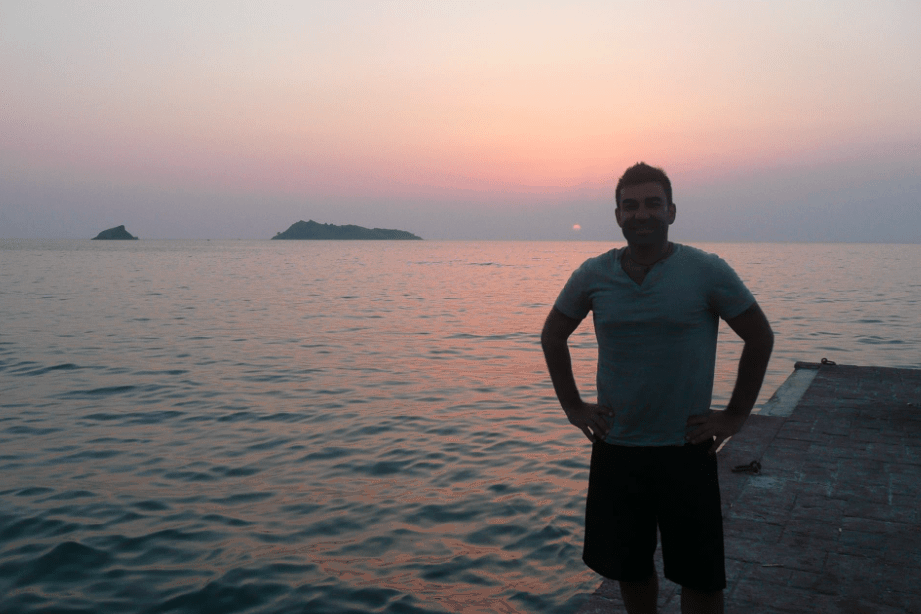
A Taste of Lesvos – Free event as part of the 35th Greek Festival of NSW
On Sunday April 2, A Taste of Lesvos will be held at Mytilene House, Canterbury. Canterbury is home to more Lesvos heritage people than any other area in the world outside Greece.
The event is an opportunity to showcase the vast history, culture and commerce of the island. Starting with a music demonstration of many talented musicians of Lesvian heritage including Spiro Bougoukas, Eleni Meli and joined by one of the best bouzouki players in the world, Tassos Bouzouki. There will be a lecture on why you should travel to Lesvos, and a talk about the great painter, Theophilos.
Also at the event Mr Costa Vertzayias, the President of the Hellenic Studies Foundation at the University of NSW will present on Asia Minor (Turkey) and its connection with Lesvos.
To add to the TASTE, a cooking demonstration will be held on how to make local food! This will be followed by a Tavli Championship.
Those attending will be treated to a range of products and services that the island is known for, including ouzo, olive oil from Gera, Kallonis FC display, literature and much more.

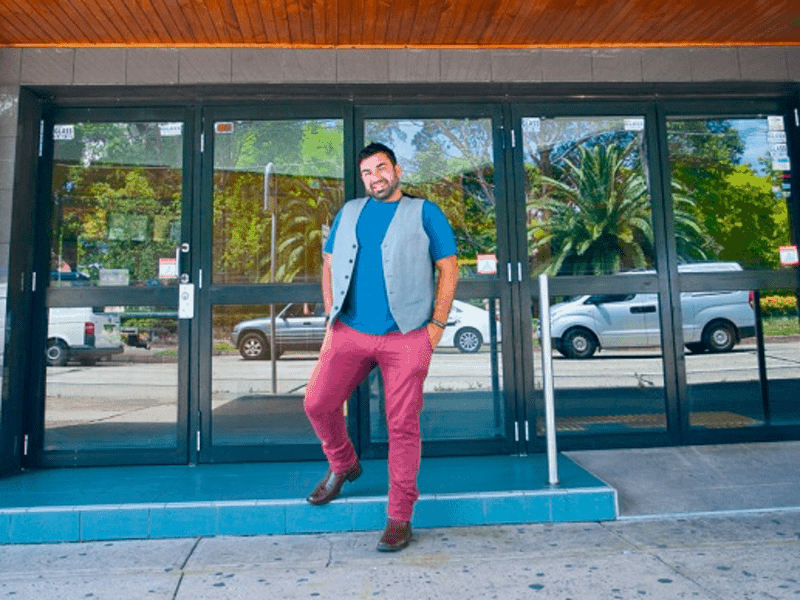


Very nice and interesting story on the lifelong journey of Mr. Cotsis.
It is important for us and our children to embrace our inherited culture and to never forget the sacrifices, toils and triumphs of our ancestors, along with the immense contributions they made, not only to the classical world, but to our present modern world as well.
Keep up the great work!
As if there aren’t enough potential topics to cover already, I’m sure Mr. Cotsis would be welcome to visit and learn the interesting stories of those Greeks of “the diaspora” who settled in the area between New York City and Chicago, places like Philadelphia Baltimore Pittsburgh and Cleveland in the US, and Toronto and Montreal in Canada.
I’m glad the younger generation (including the writer of this piece) find value in our storied past.
Thank you to Mr. Anthou for the wonderful, humbling and thoughtful feedback. I would love to visit the places you mentioned, especially Chicago, and Boston is another city, as well as Philadelphia. I have heard much of Chicago and its Greek scene, and a good friend mine was bballer in Chicago before moving to Sydney. Have heard a lot from him about Chicago. I have only been to Astoria in New York https://herculean.wordpress.com/2011/05/09/atoria-little-athens-in-the-big-apple/ Fell in love with Astoria, its Hellenic connection and of course the city of NY, wooooow! Would be great to visit all the places you mentioned in the US and hopefully I can at some stage. I have friends in Canada, I will be disappointed if I never visit, especially Toronto. At the moment, I travel as much as I can to Greece and London, which is my other spiritual home. Please keep Hellenism strong in your part of the world, look forward to seeing it soon! Billy